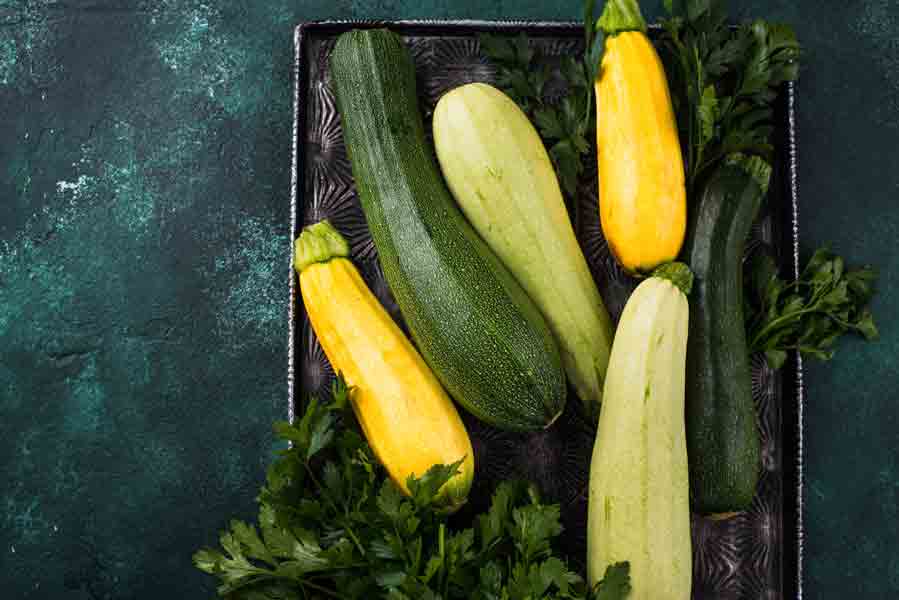Companion planting is a gardening technique where different plants are grown close together to benefit each other. This method offers numerous advantages, such as natural pest control, improved soil health, and increased garden productivity. Using zucchini companion plants can significantly enhance the growth and yield of your zucchini crop. By carefully selecting the right companion plants, you can create a thriving garden ecosystem.
Zucchini, a popular and prolific vegetable, greatly benefits from companion planting. Planting the right companions alongside zucchini helps protect it from pests, boosts pollination, and improves overall plant health. By incorporating zucchini companion plants, you can enjoy a more bountiful harvest and a healthier garden.
Best Zucchini Companion Plants Herbs
Lemon Balm
Lemon Balm is a great companion for zucchini. It repels pests like mosquitoes and gnats with its strong scent and attracts pollinators. Lemon balm also improves the overall health of your garden. However, it can spread aggressively, so plant it in a contained area or regularly prune it to manage its growth.
Benefits:
- Repels pests
- Attracts pollinators
- Improves garden health
Considerations:
- Can spread aggressively; manage growth
- Botanical Name: Melissa officinalis
- Light and Soil: Full sun to partial shade; well-drained, slightly acidic soil.
- Spacing: 12-18 inches between zucchini and lemon balm.
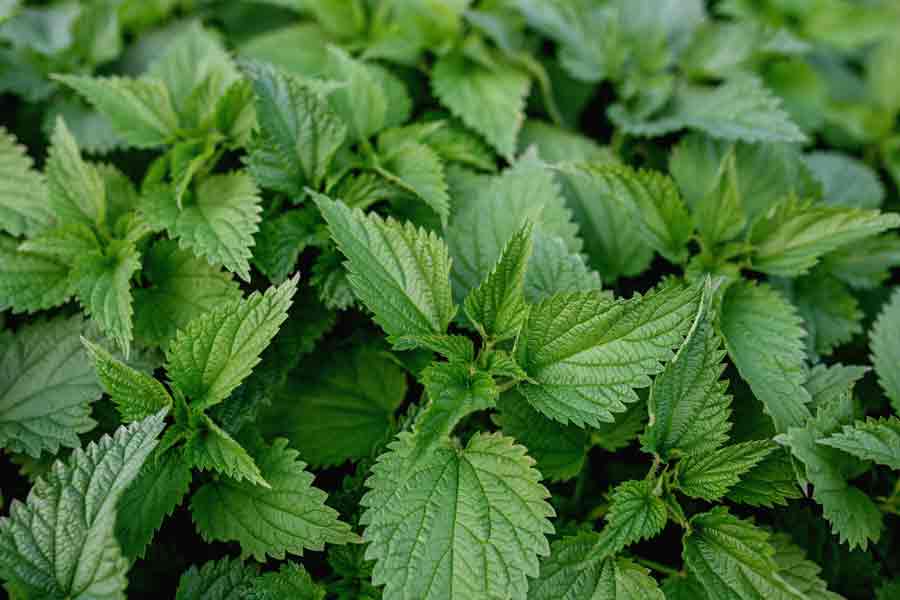
Dill
Dill makes a fantastic companion for zucchini. This herb attracts beneficial insects like ladybugs and parasitic wasps, which help control pests that may harm your zucchini plants. Additionally, dill can improve the growth and flavor of zucchini. However, consider that dill can grow quite tall, potentially shading zucchini plants if not properly managed.
Benefits:
- Attracts beneficial insects
- Improves growth and flavor
Considerations:
- Needs management to prevent shading
- Botanical Name: Anethum graveolens
- Light and Soil: Full sun; well-drained soil.
- Spacing: 12-15 inches around zucchini.
- Beneficial Attraction: Plant dill sporadically around zucchini to attract beneficial insects.
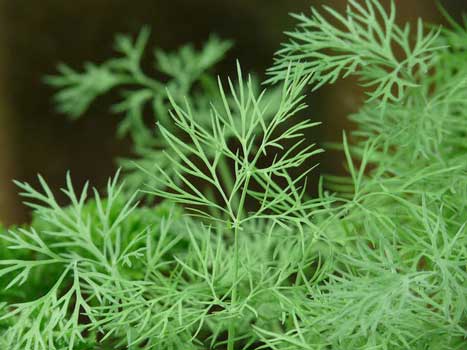
Mint
Mint is another excellent companion plant for zucchini. It repels harmful pests like aphids, beetles, and ants, protecting your zucchini from damage. The strong scent of mint also confuses pests, making it harder for them to find your zucchini. However, mint can be very invasive, so it’s best to plant it in a pot or contained area to prevent it from taking over your garden.
Benefits:
- Repels harmful pests
- Confuses pests with its scent
Considerations:
- Highly invasive; best contained
- Botanical Name: Mentha spp.
- Light and Soil: Full sun to partial shade; well-drained, moist soil.
- Spacing: Plant mint in containers near zucchini to prevent invasiveness.
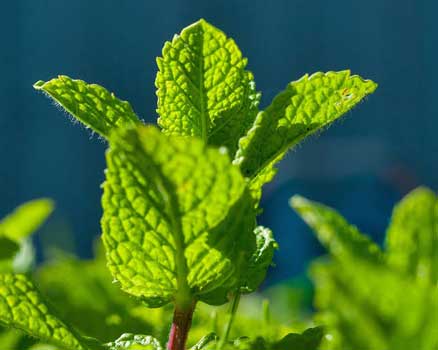
Rosemary
Rosemary is a great plant to grow alongside zucchini. Its strong scent deters many pests, such as aphids and whiteflies, that could harm your zucchini. Rosemary also helps improve air circulation around zucchini plants, reducing the risk of fungal diseases. However, rosemary prefers slightly drier soil, so make sure the watering needs of both plants are met without overwatering.
Benefits:
- Deters pests
- Improves air circulation
Considerations:
- Different watering needs
- Botanical Name: Rosmarinus officinalis
- Light and Soil: Full sun; well-drained, slightly alkaline soil.
- Spacing: 12-18 inches around zucchini.

Oregano
Oregano is a wonderful companion plant for zucchini. It attracts beneficial insects and provides ground cover, which helps retain soil moisture and prevent weed growth. This aromatic herb also has natural pest-repellent properties, keeping your zucchini safe from various pests. However, oregano can spread quickly, so regular pruning might be necessary to keep it in check.
Benefits:
- Attracts beneficial insects
- Retains soil moisture and prevents weeds
- Repels pests
Considerations:
- May require regular pruning
- Botanical Name: Origanum vulgare
- Light and Soil: Full sun; well-drained, moderately fertile soil.
- Spacing: 12-18 inches between zucchini and oregano.
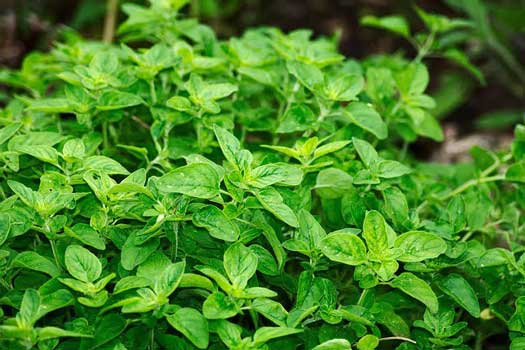
Lavender
Lavender is an excellent companion for zucchini. It repels pests like moths and beetles while attracting pollinators that help increase zucchini yields. The beautiful flowers also add a lovely touch to your garden. Lavender prefers well-drained soil, so ensure proper soil conditions for both plants to thrive.
Benefits:
- Repels pests and attracts pollinators
- Adds beauty to the garden
Considerations:
- Needs well-drained soil
- Botanical Name: Lavandula spp.
- Light and Soil: Full sun; well-drained, slightly alkaline soil.
- Spacing: 12-18 inches around zucchini.
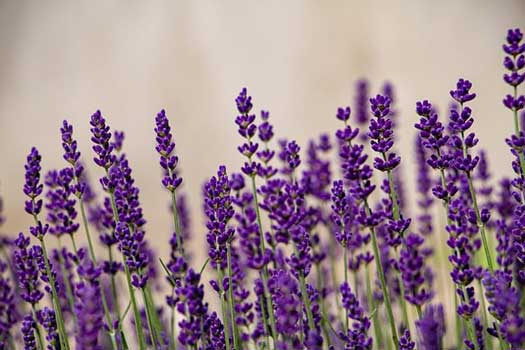
Sage
Sage is beneficial for zucchini as it repels many harmful insects, including cabbage moths and carrot flies. Its strong scent also acts as a deterrent for pests. Sage can enhance the overall health and flavor of zucchini. However, sage can be sensitive to overwatering, so balance the water requirements of both plants.
Benefits:
- Repels harmful insects
- Enhances health and flavor
Considerations:
- Sensitive to overwatering
- Botanical Name: Salvia officinalis
- Light and Soil: Full sun; well-drained, moderately fertile soil.
- Spacing: 12-18 inches between zucchini and sage.
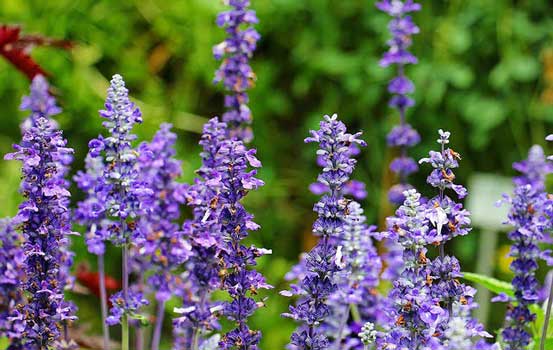
Thyme
Thyme is a fantastic companion plant for zucchini. It attracts beneficial insects and provides excellent ground cover, which helps retain soil moisture and suppress weeds. Thyme’s aromatic properties also help repel various pests. Regular pruning may be necessary to prevent thyme from spreading too much.
Benefits:
- Attracts beneficial insects
- Retains soil moisture and suppresses weeds
- Repels pests
Considerations:
- May need regular pruning
- Botanical Name: Thymus vulgaris
- Light and Soil: Full sun; well-drained, sandy soil.
- Spacing: 12-18 inches around zucchini.
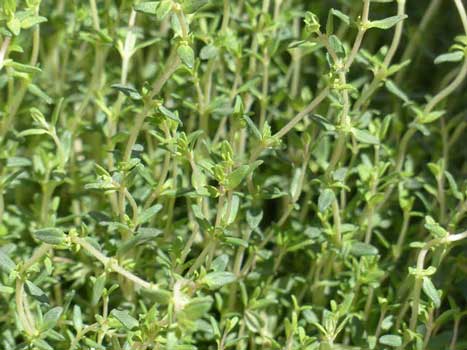
Catnip
Catnip is an excellent companion plant for zucchini. It repels pests such as aphids, flea beetles, and squash bugs, protecting your zucchini plants. Catnip also attracts beneficial insects like bees and predatory wasps. However, it can spread quickly, so manage its growth to prevent it from becoming invasive.
Benefits:
- Repels pests
- Attracts beneficial insects
Considerations:
- Can spread quickly; manage growth
- Botanical Name: Nepeta cataria
- Light and Soil: Full sun to partial shade; well-drained soil.
- Spacing: 12-18 inches around zucchini.
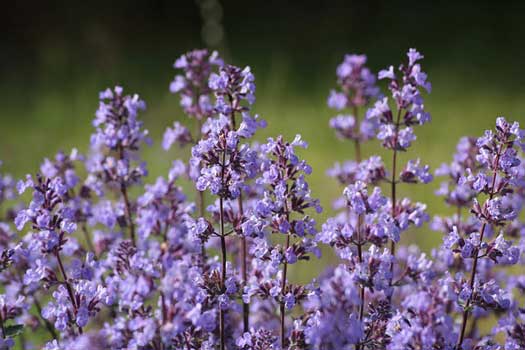
Marjoram
Marjoram is a beneficial companion plant for zucchini. It attracts beneficial insects that help control pests and improve pollination. Marjoram also enhances the flavor of zucchini when grown nearby. This herb is relatively easy to manage but ensure it has enough space to grow without overshadowing zucchini.
Benefits:
- Attracts beneficial insects
- Enhances flavor of zucchini
Considerations:
- Ensure adequate space for growth
- Botanical Name: Origanum majorana
- Light and Soil: Full sun; well-drained, fertile soil.
- Spacing: 12-18 inches between zucchini and marjoram.
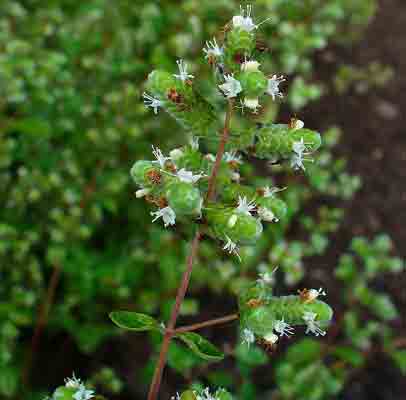
Best Zucchini Companion Plants Flower
Sweet Alyssum
Sweet Alyssum is a great companion plant for zucchini. This low-growing plant provides excellent ground cover, helping to retain soil moisture and suppress weeds. Additionally, sweet alyssum attracts beneficial insects like hoverflies and predatory wasps, which can help control pests that may harm zucchini.
Benefits:
- Provides ground cover
- Retains soil moisture and suppresses weeds
- Attracts beneficial insects
Considerations:
- None specific; generally easy to grow
- Botanical Name: Lobularia maritima
- Light and Soil: Full sun to partial shade; well-drained soil.
- Spacing: 6-12 inches around zucchini.
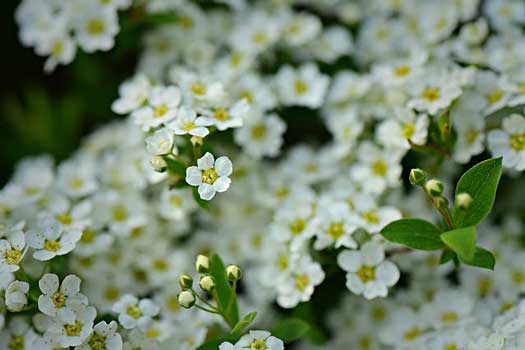
Sunflower
Sunflowers are excellent companions for zucchini. They attract pollinators and beneficial insects, improving pollination and pest control. Sunflowers also provide shade, which can be beneficial in hot climates. However, they can grow very tall, so ensure they do not overshadow zucchini plants too much.
Benefits:
- Attract pollinators and beneficial insects
- Provide shade
Considerations:
- Can grow very tall; manage shading
- Botanical Name: Helianthus annuus
- Light and Soil: Full sun; well-drained soil.
- Spacing: 18-24 inches around zucchini.
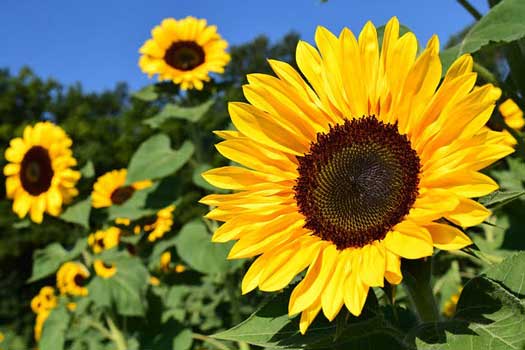
Clover
Clover is an excellent companion plant for zucchini. It fixes nitrogen in the soil, improving soil fertility and promoting healthy zucchini growth. Clover also provides good ground cover, preventing weed growth and retaining soil moisture. However, clover can spread quickly, so consider its placement carefully.
Benefits:
- Fixes nitrogen, improving soil fertility
- Provides ground cover and retains soil moisture
Considerations:
- Can spread quickly
- Botanical Name: Trifolium spp.
- Light and Soil: Full sun to partial shade; well-drained soil.
- Spacing: Plant clover as a cover crop around zucchini.

Calendula
Calendula is a valuable companion for zucchini. It attracts a variety of beneficial insects, including pollinators and predatory bugs, which help keep your zucchini plants healthy. Calendula also has natural pest-repellent properties and can enhance the overall health of the garden. However, calendula can self-seed prolifically, so manage it to prevent unwanted spread.
Benefits:
- Attracts beneficial insects
- Natural pest-repellent properties
- Enhances garden health
Considerations:
- May self-seed excessively
- Botanical Name: Calendula officinalis
- Light and Soil: Full sun to partial shade; well-drained, fertile soil.
- Spacing: 6-12 inches between zucchini and calendula.
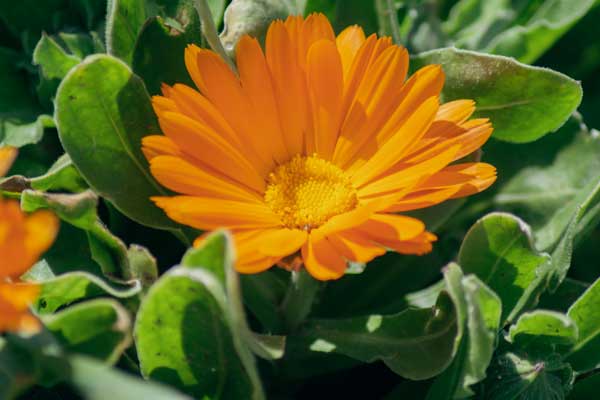
Borage
Borage is a beneficial companion for zucchini. It attracts pollinators and beneficial insects, such as bees and predatory wasps, which can help boost zucchini yields and control pests. Borage also improves soil health by adding trace minerals. However, borage can become quite large, so plant it where it won’t overshadow your zucchini.
Benefits:
- Attracts pollinators and beneficial insects
- Improves soil health
Considerations:
- Can grow large; may need space management
- Botanical Name: Borago officinalis
- Light and Soil: Full sun to partial shade; well-drained soil.
- Spacing: 12-15 inches around zucchini.
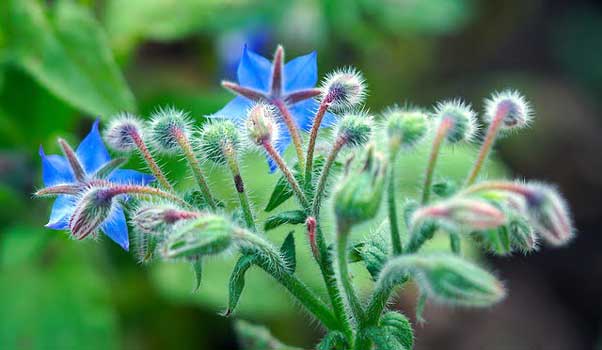
Nasturtiums
Nasturtiums are excellent companions for zucchini. They repel pests such as aphids, squash bugs, and whiteflies while attracting beneficial insects like predatory beetles and pollinators. Nasturtiums also act as a trap crop, luring pests away from zucchini. However, they can spread widely, so manage their growth to avoid overcrowding.
Benefits:
- Repels pests and attracts beneficial insects
- Acts as a trap crop
Considerations:
- Can spread widely
- Botanical Name: Tropaeolum majus
- Light and Soil: Full sun to partial shade; well-drained soil.
- Spacing: 12-15 inches between zucchini and nasturtiums.
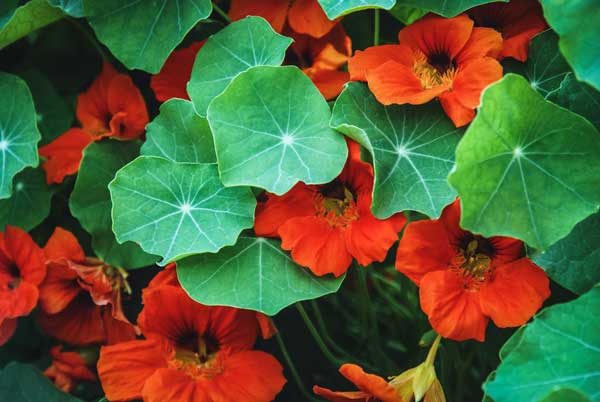
Marigolds
Marigolds are fantastic companions for zucchini. They repel a variety of pests, including nematodes and aphids, protecting your zucchini plants. Marigolds also attract beneficial insects like ladybugs and hoverflies. Furthermore, they add a splash of color to your garden. However, ensure they do not overshadow zucchini plants.
Benefits:
- Repels pests
- Attracts beneficial insects
- Adds color to the garden
Considerations:
- Ensure they do not overshadow zucchini
- Botanical Name: Tagetes spp.
- Light and Soil: Full sun; well-drained, fertile soil.
- Spacing: 6-12 inches between zucchini and marigolds.
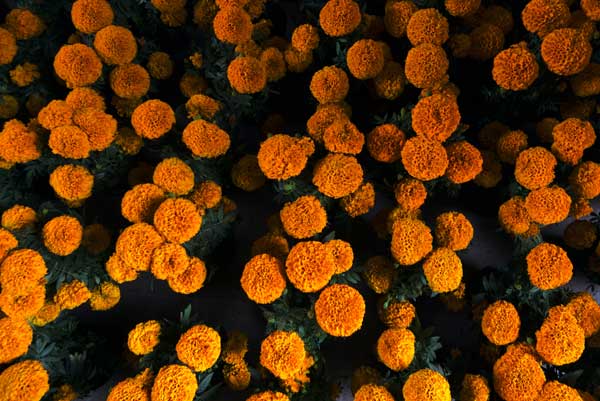
Phacelia
Phacelia is an excellent companion for zucchini. It attracts a wide range of pollinators and beneficial insects, such as bees and hoverflies, enhancing zucchini pollination and pest control. Phacelia also improves soil health by adding organic matter. It may require management to prevent it from spreading too much.
Benefits:
- Attracts pollinators and beneficial insects
- Improves soil health
Considerations:
- May need growth management
- Botanical Name: Phacelia tanacetifolia
- Light and Soil: Full sun; well-drained soil.
- Spacing: 12-18 inches around zucchini.
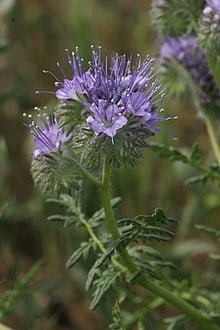
Bee Balm
Bee Balm is a wonderful companion plant for zucchini. It attracts pollinators, such as bees and butterflies, which help improve zucchini yields. Bee Balm also has a strong scent that can deter some pests. However, it can spread aggressively, so consider its placement and manage its growth.
Benefits:
- Attracts pollinators
- Deters some pests
Considerations:
- Can spread aggressively
- Botanical Name: Monarda spp.
- Light and Soil: Full sun to partial shade; well-drained, fertile soil.
- Spacing: 12-18 inches around zucchini.
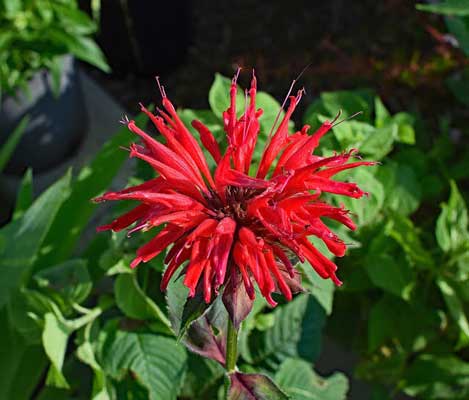
Bachelor’s Buttons
Bachelor’s Buttons, also known as cornflowers, are good companions for zucchini. They attract beneficial insects, including pollinators and predatory insects that help control pests. Their bright flowers also add beauty to your garden. However, they can self-seed readily, so keep an eye on their spread.
Benefits:
- Attracts beneficial insects
- Adds beauty to the garden
Considerations:
- Can self-seed readily
- Botanical Name: Centaurea cyanus
- Light and Soil: Full sun to partial shade; well-drained soil.
- Spacing: 6-12 inches around zucchini.
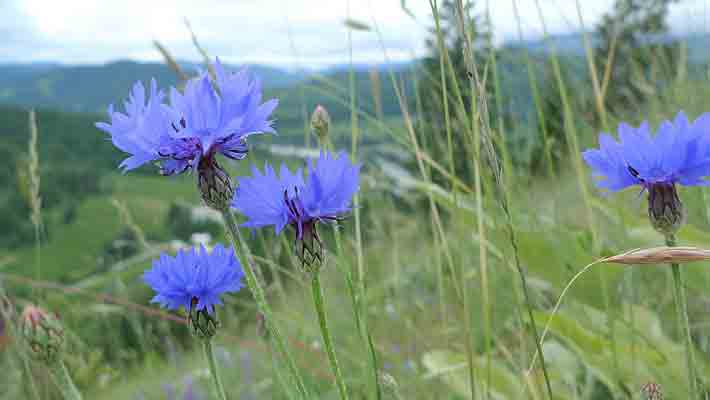
Snapdragons
Snapdragons make a delightful companion for zucchini. They attract pollinators and beneficial insects, improving pollination and pest control. Snapdragons also add vibrant color to your garden. However, ensure they have enough space and sunlight without overshadowing your zucchini plants.
Benefits:
- Attracts pollinators and beneficial insects
- Adds vibrant color
Considerations:
- Ensure adequate space and sunlight
- Botanical Name: Antirrhinum majus
- Light and Soil: Full sun to partial shade; well-drained, fertile soil.
- Spacing: 6-12 inches around zucchini.
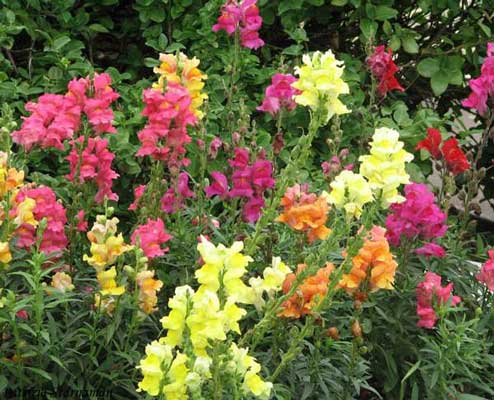
Echinacea
Echinacea, also known as coneflower, is a great companion for zucchini. It attracts pollinators and beneficial insects, aiding in zucchini pollination and pest control. Echinacea also adds beauty and biodiversity to your garden. However, it needs well-drained soil, so ensure proper soil conditions for both plants.
Benefits:
- Attracts pollinators and beneficial insects
- Adds beauty and biodiversity
Considerations:
- Needs well-drained soil
- Botanical Name: Echinacea purpurea
- Light and Soil: Full sun; well-drained soil.
- Spacing: 12-18 inches around zucchini.

Yarrow
Yarrow is an excellent companion for zucchini. It attracts beneficial insects such as ladybugs, parasitic wasps, and hoverflies, which help control pests. Yarrow also improves soil health and can enhance the growth of nearby plants. However, it can spread rapidly, so regular pruning might be necessary.
Benefits:
- Attracts beneficial insects
- Improves soil health
Considerations:
- May require regular pruning
- Botanical Name: Achillea millefolium
- Light and Soil: Full sun; well-drained soil.
- Spacing: 12-18 inches around zucchini.
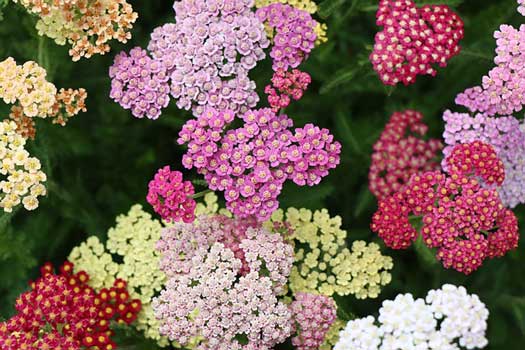
Zinnias
Zinnias are fantastic companions for zucchini. They attract pollinators and beneficial insects, enhancing pollination and pest control. Zinnias also add bright, cheerful colors to your garden. However, they can grow quite tall, so plant them where they won’t overshadow your zucchini.
Benefits:
- Attracts pollinators and beneficial insects
- Adds bright colors to the garden
Considerations:
- Can grow tall; may need space management
- Botanical Name: Zinnia elegans
- Light and Soil: Full sun; well-drained soil.
- Spacing: 12-18 inches around zucchini.
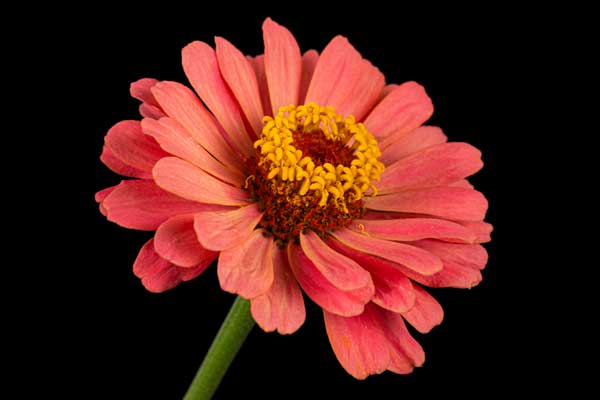
Tansy
Tansy is a beneficial companion for zucchini. It repels pests such as ants, beetles, and squash bugs. Tansy also attracts beneficial insects like predatory wasps and ladybugs. However, tansy can be toxic to some animals and humans if ingested, so plant it with caution and keep it away from children and pets.
Benefits:
- Repels pests
- Attracts beneficial insects
Considerations:
- Can be toxic; plant with caution
- Botanical Name: Tanacetum vulgare
- Light and Soil: Full sun to partial shade; well-drained soil.
- Spacing: 12-18 inches around zucchini.
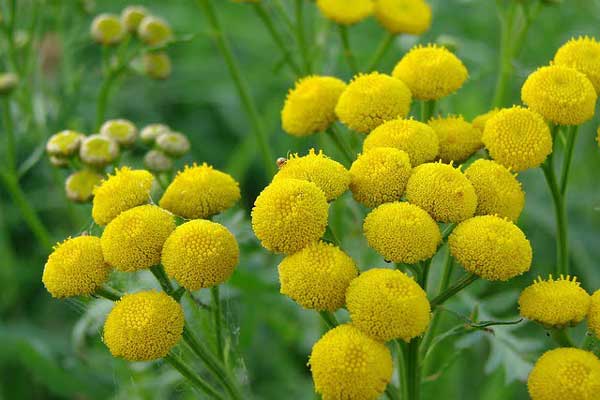
Chamomile
Chamomile is a beneficial companion for zucchini. It attracts beneficial insects like hoverflies and parasitic wasps, which help control pests. Chamomile also improves soil health by releasing nutrients as it decomposes. However, it can self-seed easily, so manage its spread to avoid overcrowding.
Benefits:
- Attracts beneficial insects
- Improves soil health
Considerations:
- Can self-seed easily; manage spread
- Botanical Name: Matricaria chamomilla
- Light and Soil: Full sun to partial shade; well-drained soil.
- Spacing: 12-18 inches around zucchini.
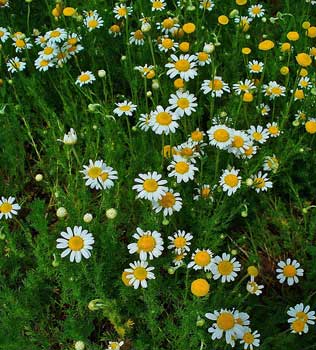
Best Zucchini Companion Plants Vegetable
Corn
Corn is a classic companion plant for zucchini. It provides shade for zucchini, which can be beneficial in hot climates. Corn also serves as a natural trellis for climbing plants like beans, which can further support zucchini by fixing nitrogen in the soil. However, ensure adequate spacing to avoid competition for resources.
Benefits:
- Provides shade
- Natural trellis for climbing plants
Considerations:
- Ensure adequate spacing
- Botanical Name: Zea mays
- Light and Soil: Full sun; well-drained, fertile soil.
- Spacing: 12-18 inches between zucchini and corn.
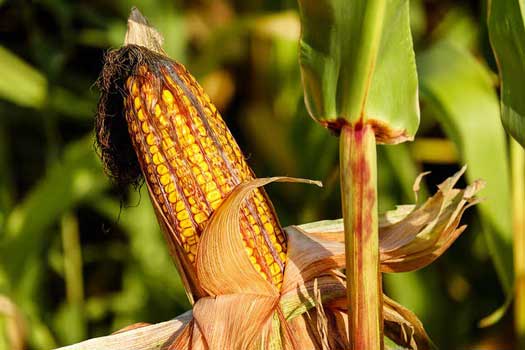
Peas
Peas are excellent companions for zucchini. They fix nitrogen in the soil, enriching it and promoting healthy zucchini growth. Peas also provide ground cover, helping to retain soil moisture and prevent weed growth. However, they have a shorter growing season, so plan your planting times accordingly.
Benefits:
- Fix nitrogen in the soil
- Provide ground cover
Considerations:
- Shorter growing season
- Botanical Name: Pisum sativum
- Light and Soil: Full sun to partial shade; well-drained, fertile soil.
- Spacing: 6-8 inches between zucchini and peas.
Read About: Companion Plants For Peas
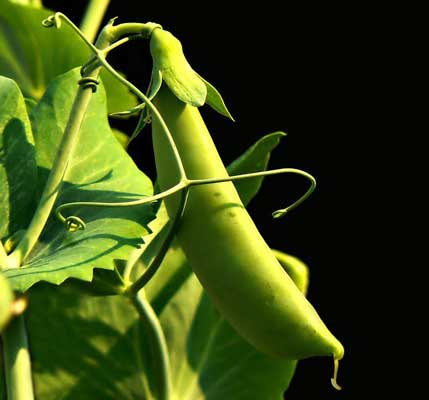
Tomatoes
Tomatoes are good companions for zucchini, although they require careful management. They attract beneficial insects and improve soil health. Both plants have similar growing conditions and can thrive together. However, tomatoes and zucchini can compete for nutrients, so ensure they are adequately spaced and receive sufficient nutrients.
Benefits:
- Attract beneficial insects
- Improve soil health
Considerations:
- Can compete for nutrients; ensure adequate spacing
- Botanical Name: Solanum lycopersicum
- Light and Soil: Full sun; well-drained, fertile soil.
- Spacing: 18-24 inches between zucchini and tomatoes.
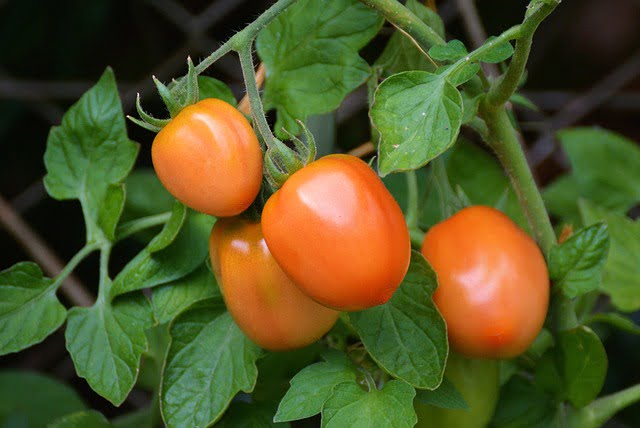
Beans
Beans are great companions for zucchini. Like peas, they fix nitrogen in the soil, which improves soil fertility and supports healthy zucchini growth. Beans also provide ground cover, which helps retain moisture and suppress weeds. However, be mindful of their growing habits to prevent entanglement with zucchini vines.
Benefits:
- Fix nitrogen in the soil
- Provide ground cover
Considerations:
- Manage growing habits to prevent entanglement
- Botanical Name: Phaseolus vulgaris
- Light and Soil: Full sun; well-drained, fertile soil.
- Spacing: 6-8 inches between zucchini and beans.
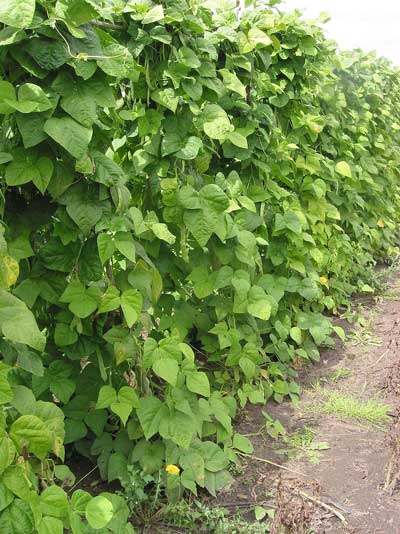
Garlic
Garlic is an excellent companion for zucchini. It repels many common garden pests, such as aphids and beetles, protecting your zucchini plants. Garlic also improves soil health and can enhance the flavor of zucchini. However, it prefers slightly different soil conditions, so ensure both plants’ needs are met.
Benefits:
- Repels pests
- Improves soil health
Considerations:
- Different soil preferences
- Botanical Name: Allium sativum
- Light and Soil: Full sun; well-drained, fertile soil.
- Spacing: 6-8 inches between zucchini and garlic.

Onions
Onions are great companions for zucchini. They repel pests like aphids, beetles, and rabbits, keeping your zucchini safe. Onions also improve soil health and can be easily interplanted with zucchini. However, ensure they do not overshadow young zucchini plants.
Benefits:
- Repel pests
- Improve soil health
Considerations:
- Ensure they do not overshadow young plants
- Botanical Name: Allium cepa
- Light and Soil: Full sun; well-drained, fertile soil.
- Spacing: 8-12 inches between zucchini and onions.

Peppers
Peppers are good companions for zucchini. They attract beneficial insects that help with pest control and improve overall garden health. Both peppers and zucchini thrive in similar growing conditions, making them compatible. However, like tomatoes, they can compete for nutrients, so provide adequate spacing and nutrition.
Benefits:
- Attract beneficial insects
- Improve garden health
Considerations:
- Can compete for nutrients; ensure adequate spacing
- Botanical Name: Capsicum spp.
- Light and Soil: Full sun; well-drained, fertile soil.
- Spacing: 12-18 inches between zucchini and peppers.
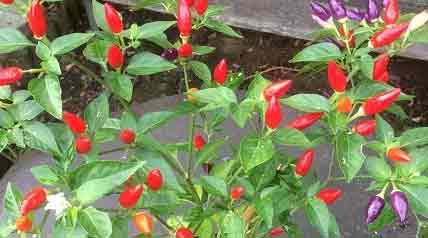
Radish
Radishes are excellent companions for zucchini. They help deter pests like cucumber beetles and squash bugs. Radishes also mature quickly, providing a harvest before zucchini plants get too large. Additionally, radishes can help break up compacted soil. However, avoid planting too many, as they can compete for nutrients.
Benefits:
- Deter pests
- Mature quickly
- Break up compacted soil
Considerations:
- Avoid overcrowding
- Botanical Name: Raphanus sativus
- Light and Soil: Full sun to partial shade; well-drained, fertile soil.
- Spacing: 4-6 inches between zucchini and radishes.
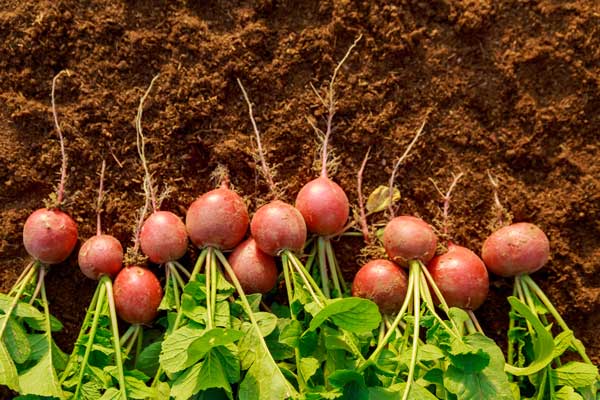
Carrots
Carrots are beneficial companions for zucchini. Their deep roots help break up and aerate the soil, improving soil structure and health. Carrots do not compete with zucchini for space as they grow underground while zucchini spreads out above ground. However, be cautious of overcrowding, as both plants need adequate space to thrive.
Benefits:
- Improve soil structure
- Do not compete for space
Considerations:
- Avoid overcrowding
- Botanical Name: Daucus carota subsp. sativus
- Light and Soil: Full sun to partial shade; well-drained, sandy loam soil.
- Spacing: 6-8 inches between zucchini and carrots.
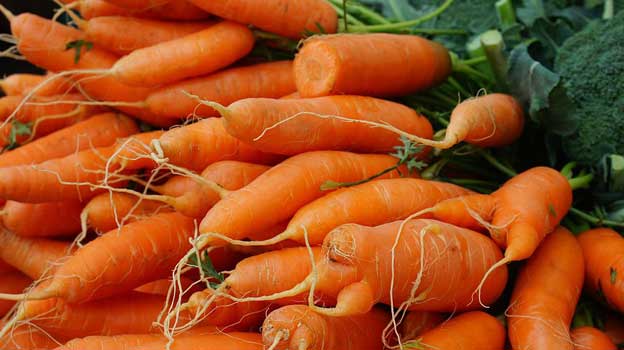
Spinach
Spinach is a good companion for zucchini. It provides ground cover, helping to retain soil moisture and suppress weeds. Spinach also matures quickly, allowing for multiple harvests before zucchini plants spread out. However, spinach prefers cooler temperatures, so plan your planting times accordingly.
Benefits:
- Provides ground cover
- Retains soil moisture and suppresses weeds
- Matures quickly
Considerations:
- Prefers cooler temperatures
- Botanical Name: Spinacia oleracea
- Light and Soil: Full sun to partial shade; well-drained, fertile soil.
- Spacing: 6-8 inches between zucchini and spinach.

Beets
Beets make good companions for zucchini. Their roots help improve soil health by breaking up compacted soil. Beets also provide some ground cover, which helps retain soil moisture and suppress weeds. Additionally, beets and zucchini do not compete for the same root space, making them compatible. However, ensure that both plants have enough space to grow properly.
Benefits:
- Improve soil health
- Provide ground cover
- Do not compete for root space
Considerations:
- Ensure enough space for both plants to grow
- Botanical Name: Beta vulgaris
- Light and Soil: Full sun to partial shade; well-drained, loamy soil.
- Spacing: 4-6 inches between zucchini and beets.

Bad Companion Plants for Zucchini
While companion planting can greatly benefit your zucchini, it’s important to know which plants to avoid. Some plants can compete for nutrients, attract pests, or stunt the growth of zucchini. By steering clear of these bad companion plants, you can ensure a healthier and more productive zucchini crop.
For instance, potatoes are not ideal companions for zucchini. They compete for nutrients and space, which can hinder the growth of your zucchini plants. Additionally, potatoes attract similar pests, increasing the risk of infestations.
Another example is fennel. Fennel secretes a substance that can inhibit the growth of zucchini and other nearby plants. This can result in stunted growth and lower yields.
Brassicas, such as broccoli, cauliflower, and cabbage, should also be avoided. These plants compete for the same nutrients and space, which can lead to reduced growth and productivity for zucchini. Moreover, they attract pests that can harm zucchini.
Lastly, pumpkins and other vining squash can compete with zucchini for space and resources. They can also cross-pollinate with zucchini, resulting in undesirable hybrid fruits.
By being mindful of these bad companion plants and choosing better-suited companions, you can create a thriving garden environment that supports the healthy growth of your zucchini plants.
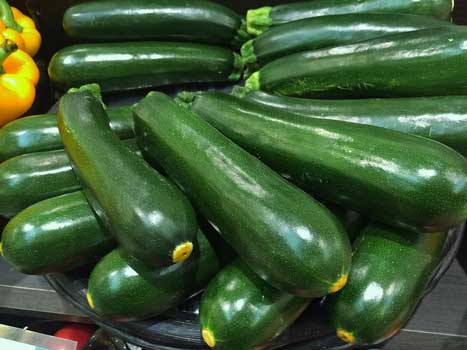
FAQ: Zucchini Companion Plants
What grows well with zucchini?
Many plants grow well with zucchini. Good companion plants include corn, peas, beans, and radishes. These plants help improve soil health, attract beneficial insects, and deter pests, creating a thriving environment for zucchini.
What should you plant next to zucchini?
You should plant companions like marigolds, nasturtiums, and beans next to zucchini. These plants can enhance growth, repel pests, and attract beneficial insects, helping your zucchini plants flourish.
Can you plant zucchini and cucumbers together?
It is not recommended to plant zucchini and cucumbers together. Both plants are heavy feeders and can compete for nutrients, potentially stunting each other’s growth. They also attract similar pests, increasing the risk of infestations.
What are bad companion plants for zucchini?
Bad companion plants for zucchini include potatoes, fennel, and brassicas (such as broccoli, cauliflower, and cabbage). These plants can compete for nutrients and space, inhibit growth, or attract harmful pests.
Can you plant squash and zucchini together?
It is best to avoid planting squash and zucchini together. Both plants have similar growth habits and can compete for space, sunlight, and nutrients. They can also cross-pollinate, leading to undesirable hybrid fruits.
What is a good companion plant for zucchini?
Good companion plants for zucchini include corn, peas, beans, radishes, and marigolds. These plants help improve soil health, attract beneficial insects, and repel pests, promoting healthy zucchini growth.
Can you plant zucchini and tomatoes together?
Yes, you can plant zucchini and tomatoes together. Both plants benefit from similar growing conditions. However, ensure they have enough space and nutrients to avoid competition, as both are heavy feeders.
What are the best companion plants for zucchini?
The best companion plants for zucchini include corn, peas, beans, radishes, marigolds, nasturtiums, and borage. These plants support zucchini growth by improving soil health, attracting beneficial insects, and repelling pests.
What are good companion plants for zucchini in containers?
In containers, good companion plants for zucchini include nasturtiums, marigolds, and herbs like basil and oregano. These plants can help repel pests, attract pollinators, and enhance the overall health of your zucchini.
Are carrots and zucchini good companion plants?
Yes, carrots and zucchini are good companion plants. Carrots help aerate the soil, improving root growth for zucchini. Additionally, their different root structures mean they don’t compete heavily for nutrients.
Are zucchini and peppers good companion plants?
Yes, zucchini and peppers are good companion plants. Peppers attract beneficial insects that help control pests, and both plants thrive in similar growing conditions.
Are squash and zucchini good companion plants?
It is better to avoid planting squash and zucchini together. They can compete for space and nutrients and may cross-pollinate, leading to undesirable hybrid fruits.
Are beets and zucchini good companion plants?
Yes, beets and zucchini are good companion plants. Beets have deep roots that don’t compete with zucchini’s shallow roots, helping to maximize garden space and nutrient use.
Are tomatoes and zucchini good companion plants?
Yes, tomatoes and zucchini can be planted together. They have similar growing requirements, but make sure to provide enough space and nutrients for both to thrive without competing.
Are corn and zucchini good companion plants?
Yes, corn and zucchini are excellent companion plants. Corn provides shade and acts as a natural trellis, while zucchini benefits from the additional structure and reduced pest pressure.
Are onions good companion plants for zucchini?
Yes, onions are good companion plants for zucchini. Onions repel pests such as aphids and beetles, helping to protect your zucchini plants.
Are peas and zucchini good companion plants?
Yes, peas and zucchini are good companion plants. Peas fix nitrogen in the soil, enriching it for zucchini growth, and provide ground cover to retain soil moisture.
Are peppers and zucchini good companion plants?
Yes, peppers and zucchini are good companion plants. Peppers attract beneficial insects that help with pest control, and both plants thrive in similar conditions, promoting a healthy garden ecosystem

